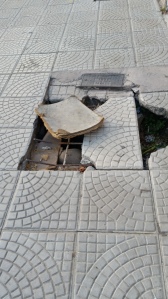 Pay attention to where you’re going. It’s one of the lessons I learned in Cochabamba.
Pay attention to where you’re going. It’s one of the lessons I learned in Cochabamba.
Daily I had to be aware of what was in front of me. Figuratively and literally.
Uneven sidewalks, crumbling concrete, hidden holes — all threatened to trip me up as I walked the streets of Cochabamba. Entire slabs of cement jut out like in the aftermath of an earthquake. No sidewalks are flat and even. If I wanted to stay vertical, I had to pay attention.

And if walking on the sidewalk wasn’t easy to maneuver and threatened my safety, crossing the street was worse.
Pedestrians never have the right-of-way in Cochabamba. No matter if you’re in the crosswalk, the traffic light is in your favor, or you’re already half way across the street. Drivers will not stop or slow down. They constantly beep their horn at you. Even if you’re only near the curb or simply walking in that direction. Their message is clear: “Don’t even think about it.”
Other lessons I learned:
How to approach strangers and strike up a conversation, asking important questions like “Where can I buy the best helado (ice cream)?”
How to meet desafíos (challenges) and speak up for what I needed in a language I was only beginning to learn, with people I was not entirely comfortable with. Not easy for an introverted, introspective person like me. But I did it. Time and again. It gave me a taste — just a taste — of what it’s like for a migrant trying to survive in a foreign country.
How to look the other way when encountering a naked campesino —peasant farmers that have come to the city to work —squatting in the canal to relieve himself or to wash his body in the only water available.
How to hold and feed one baby in my arms while pushing another one in a Fisher Price swing, using my elbow or foot.
I miss holding those babies at the orphanage. When I imagine Teresa and Pablo, Adriana, Jhon, Nichol, and Breiseda, when I remember the tiny knots in their hair from lying in their cribs for so long, and I wonder if anyone is cradling them now, I cry. Their situation seems hopeless. Yet I know it isn’t.
I also know I can’t go back to care for those orphans. Here’s why. As much as I loved the beauty and culture of the country, my teachers, and friends I made, something was missing. My heart was not in Cochabamba. It remains with the migrants and refugees at the U.S.-Mexico border. Still.
Did I need to go all the way to Bolivia to learn this? Apparently so.
Because besides learning Spanish and gaining clarity about where my heart lies, I received other necessary lessons. Lessons about courage to face the feelings arising in what I was experiencing. Lessons about finding true hope in the midst of feelings of hopelessness.
If all had gone according to my expectations, according to my well-laid plans, it would have been easy to have faith in my self-made God, to “hope” in my ego’s ideas of what the world “should” be. But God asks more of me than this. God asks me to trust even when I feel betrayed, angry, hopeless in this place of my own making. And then to be present to those feelings. Long enough to come out the other side.
As the Pathwork teaches, through the gateway of feeling my hopelessness lies true and justified hope. That’s something I’ll need if I’m to serve those who would have little reason to hope.
Spiritual writer and teacher Cynthia Bourgeault says in Mystical Hope:
“Hope fills us with the strength to stay present, to abide in the flow of the Mercy no matter what outer storms assail us. It is entered always and only through surrender; that is, through the willingness to let go of everything we are presently clinging to.”
May I let go and surrender. To the presence that has always been right in front of me.


